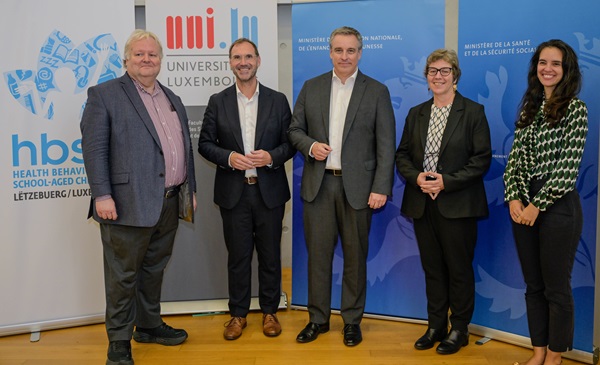 (L-R): Prof. Robert Harmsen, Uni.lu; Prof. Jens Kreisel, Uni.lu Rector; Minister Claude Meisch; Minister Martine Deprez; Dr Carolina Catunda, Uni.lu;
Credit: MENJE
(L-R): Prof. Robert Harmsen, Uni.lu; Prof. Jens Kreisel, Uni.lu Rector; Minister Claude Meisch; Minister Martine Deprez; Dr Carolina Catunda, Uni.lu;
Credit: MENJE
On Thursday 17 October 2024, the results of the 2022 HBSC (Health Behaviour in School-aged Children) study were presented at the Belval campus of the University of Luxembourg, in the presence of Luxembourg's Minister of Education, Children and Youth, Claude Meisch, and the Minister of Health and Social Security, Martine Deprez.
Conducted every four years among students aged eleven to eighteen years, the HBSC study is an international research project that examines the health behaviour and well-being of adolescents in Europe, Central Asia and North America. Conducted in collaboration with the World Health Organization (WHO), Luxembourg has regularly participated in these studies since 2006.
During the presentation on 17 October, the results of the study conducted in 2022 by the University of Luxembourg, in which 7,893 young people in Luxembourg participated, were detailed and discussed. The results are broken down into five separate reports, which focus respectively on mental health and well-being, health and risk behaviours, health-related behaviours, the social context, the impact of the COVID-19 pandemic on children and adolescents, and trends between 2006 and 2022.
For Minister Meisch, the HBSC study provides valuable information on the reality of young people's lives in Luxembourg, which makes it possible to focus educational policy on their targeted needs, in order to sustainably improve their future chances. He stated: "The 2022 edition of the HBSC study confirms, in particular, the urgent need to act on the central challenges of screen time and risky behaviours that can harm the mental and physical health of young people. This is precisely the objective of the 'Screen-Life-Balance' campaign launched at the beginning of October."
In terms of educational policy, the main conclusions of the HBSC 2022 study in Luxembourg are as follows:
- The prevalence of problematic use of social networks increased from 5.9% in 2018 to 9.1% in 2022. It affects twice as many girls (11.7%) as boys (6.4%). This phenomenon underlines the importance of reducing screen time to improve the mental health of young people and to help them find a balance between screen use and other activities that promote their well-being.
- Regular physical activity has a positive impact on mental health, while reducing the risk of obesity. Physically active young people report better well-being and are less likely to be overweight. However, girls are half as active as boys. Promoting physical activity is also an integral part of the "Screen-Life-Balance" initiative.
- During the COVID-19 pandemic, school closures increased academic pressure among young people. In Luxembourg, the majority of young people have shown resilience to limit the negative effects of the pandemic. The approach of keeping schools open as much as possible has therefore proven to have been the right one. However, some young people, particularly girls, have seen their mental health deteriorate. It is important to analyse this phenomenon and its causes in more detail in order to design more targeted support measures, if necessary.
The results of the 2022 HBSC study highlight key priorities for improving young people's health, particularly in the areas of mental health, social inequalities and risky behaviours.
Promoting healthy physical behaviours: Enabling children and adolescents, as well as their families, to adopt healthy eating and physical activity habits is crucial. Since 2006, the GIMB (Eat Healthy, Move More) initiative has aimed to combat overweight and obesity, in particular by encouraging regular physical activity, which is recognised for its positive effects on young people's general well-being.
Youth mental health: The study findings show a deterioration in life satisfaction, particularly among girls, as well as a growing sense of loneliness. In the face of these challenges, a stronger focus on mental health is essential. The National Mental Health Plan, with a focus on young people, and the SAS (Emotional and Sexual Health) plan aim to improve self-image and combat feelings of loneliness. These actions must continue and intensify.
Supportive social environment: Creating environments that support the overall health and well-being of young people is a priority for the Department of Health and Social Security. Schools, families and society as a whole must be places where every child can feel supported, safe and fulfilled.
Health literacy: Strengthening health literacy is essential to provide young people and their families with all the tools they need to strengthen the well-being of each child and future generations. This approach aims to enable them to make informed choices to lead healthier and happier lives.
Minister Deprez stated: "The implementation of national policies requires close promotion and prevention work between the health and education sectors, which places our young people at the centre of concerns. We must redouble our efforts to offer every child an environment where they can grow up healthy, both physically and mentally."








